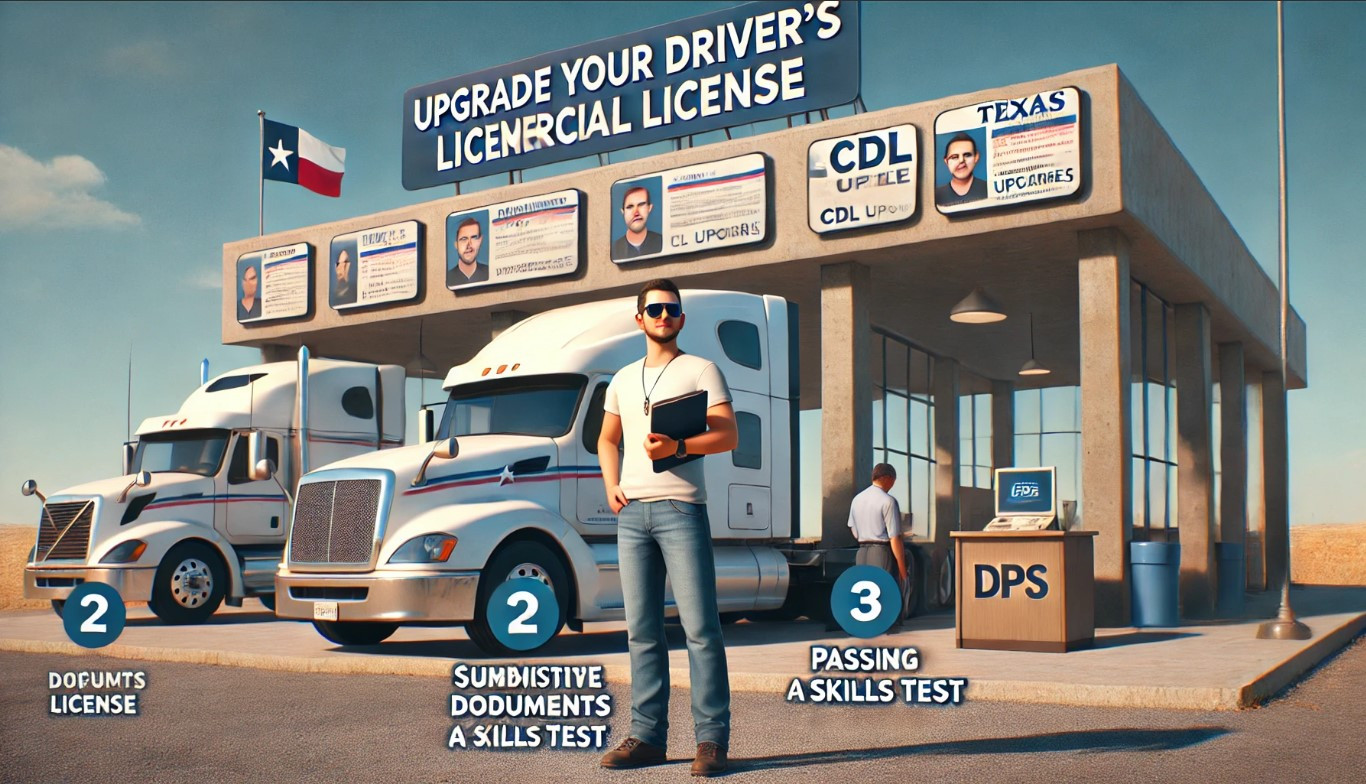Upgrading your standard driver’s license to a Commercial Driver’s License (CDL) is an important step if you’re looking to expand your driving career. A CDL allows you to operate commercial vehicles, including trucks, buses, and other large vehicles. For residents of Houston, Texas, the process involves specific requirements and steps.
At Get Drivers Ed, we provide essential resources to help drivers navigate the process of obtaining a CDL. This comprehensive guide outlines everything you need to know about upgrading your license in Houston.
1. Understanding the Benefits of a CDL
Before diving into the process, it’s important to understand why upgrading to a CDL is worth considering.
Career Opportunities:
A CDL opens the door to lucrative careers in industries like trucking, public transportation, and logistics. With Houston’s thriving economy, CDL drivers are in high demand.
Earning Potential:
CDL holders often earn higher salaries compared to non-commercial drivers, especially for specialized roles like hazmat or tanker truck driving.
Expanded Driving Privileges:
A CDL allows you to operate larger vehicles, giving you greater flexibility and versatility in your driving career.
2. CDL Requirements in Houston, Texas
To upgrade your standard license to a CDL, you’ll need to meet specific state and federal requirements.
Eligibility Criteria:
Age: Be at least 18 years old to drive intrastate (within Texas) or 21 for interstate driving.
Valid Texas Driver’s License: You must hold a valid, unexpired Texas driver’s license.
Clean Driving Record: Ensure your driving record is free of major violations that could disqualify you.
Medical Certification:
Obtain a Department of Transportation (DOT) medical certificate by passing a physical exam.
The exam ensures you’re physically fit to operate commercial vehicles.
At Get Drivers Ed, we emphasize the importance of meeting these requirements to ensure a smooth application process.
3. CDL Classes and Endorsements
Texas offers different classes of CDLs based on the type of vehicle you intend to drive.
CDL Classes:
Class A: For combination vehicles with a weight of 26,001 pounds or more, such as tractor-trailers.
Class B: For single vehicles weighing 26,001 pounds or more, including buses and dump trucks.
Class C: For vehicles carrying hazardous materials or 16 or more passengers, such as small buses.
CDL Endorsements:
To operate certain vehicles, you’ll need additional endorsements, including:
H (Hazmat): For transporting hazardous materials.
P (Passenger): For carrying passengers, such as in buses.
T (Tanker): For operating tanker vehicles.
Understanding these classifications and endorsements is crucial for choosing the right CDL for your career goals.
4. Steps to Upgrade to a CDL in Houston
The process to upgrade your license to a CDL involves several key steps.
Step 1: Obtain a Texas Commercial Learner’s Permit (CLP):
Study the Texas Commercial Motor Vehicle Driver’s Handbook, which covers CDL regulations and safety guidelines.
Pass the written knowledge exams for your desired CDL class and any applicable endorsements.
Hold the CLP for at least 14 days before taking the skills test.
Step 2: Enroll in a CDL Training Program:
While not mandatory, enrolling in a CDL training program is highly recommended. Training provides hands-on experience with commercial vehicles and prepares you for the skills test. Get Drivers Ed offers comprehensive resources to help you succeed.
Step 3: Schedule and Pass the CDL Skills Test:
The skills test includes three parts: pre-trip inspection, basic vehicle control, and on-road driving.
Practice extensively to ensure you’re comfortable with the vehicle and test procedures.
Step 4: Submit Your Application and Pay Fees:
Visit a Texas Department of Public Safety (DPS) office in Houston to complete your application.
Pay the required fees, which vary based on the CDL class and endorsements.
5. Tips for Success in Obtaining Your CDL
Upgrading to a CDL requires preparation and focus. These tips can help you succeed:
Study Thoroughly:
Review the Texas Commercial Motor Vehicle Driver’s Handbook and take practice tests to familiarize yourself with the material.
Practice Driving:
Gain hands-on experience with a commercial vehicle, especially if you’re pursuing Class A or B licenses.
Stay Organized:
Keep all necessary documents, including your medical certificate and CLP, readily available for appointments and tests.
At Get Drivers Ed, we provide study resources and expert guidance to ensure your success throughout the process.
6. Maintaining Your CDL
Once you’ve obtained your CDL, it’s essential to stay compliant with state and federal regulations.
Renewals and Medical Updates:
Renew your CDL before it expires to avoid penalties.
Update your medical certificate as required to maintain your eligibility.
Continued Education:
Consider additional endorsements or specialized training to expand your career opportunities and stay competitive in the job market.
Get Drivers Ed offers ongoing support for CDL holders to help them grow and succeed in their careers.
Conclusion: Advance Your Driving Career with Get Drivers Ed
Upgrading your driver’s license to a Commercial Driver’s License (CDL) in Houston, Texas, is a rewarding step that opens doors to numerous opportunities. By understanding the requirements, preparing thoroughly, and following the process, you can achieve your goal and unlock a promising driving career.
At Get Drivers Ed, we’re committed to supporting drivers at every stage of their journey. Whether you’re studying for your CLP or preparing for the skills test, our online courses provide the resources and confidence you need to succeed.

